In Defense of ‘The Room’: Atmosphere and Tone

Once the Author is gone, the claim to “decipher” a text becomes quite useless. To give an Author to a text is to impose upon that text a stop clause, to furnish it with a final signification, to close the writing.
– Roland Barthes, “The Death of the Author” (1967)
The Room, written, directed, and starring filmmaker-actor Tommy Wiseau is infamously awful. It has become a recurring Adult Swim April Fool’s joke. It’s the film that finally beat out Plan 9 from Outer Space (1959) and Troll 2 (1990) from the top slot of, for lack of a better term, “the Citizen Kane of bad movies.” And it will forever remain a midnight movie cult classic legend.
The Room’s amateur acting and haphazard writing and directing, coupled with Wiseau’s Johnny character, the protagonist, and Wiseau’s overall eccentric, mysterious persona have transformed this blatant multi-million dollar vanity project into a memorable, wild experience.
The Room could easily be described by the age-old critique “it’s so bad it’s good,” which The Room certainly is, but this explanation of the film is not entirely useful. The Room is far more complex than that, and despite Wiseau’s sporadic direction, the film achieves an unprecedented level of emergent atmosphere and tone. While Wiseau famously cited Tennessee Williams as inspiration, The Room, the film subtracted of its director, is something wholly original and horrifying. Wiseau’s initial intentions are no longer relevant.
A bit of a preface: my first experience with the film was during one of the Adult Swim April Fool’s airings a few years ago. I was aware of The Room, and had seen the “Evil Man” promo image on the internet, but disregarded it as some kind of horror film.
Drifting in and out of a drowsy stupor, I watched the late-night nightmare unfold, Adult Swim’s tongue-in-cheek humor lost on me. The film’s relentless lack of consistent characters and plotting, its complete disregard for reality, its repetitive, creepy sex scenes, the general lack of moral storytelling, the existence of the character Johnny (his elusive voice, his piercing face), and the film’s absurd contortion of, I guess, Tennessee Williams-style drama leads The Room to be one of the most uncomfortable film experiences in the history of cinema. And that soundtrack…
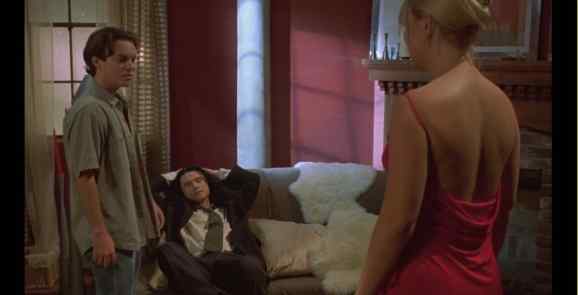
The film left a morbid taste in my mouth, and it was not until subsequent viewings (one of which was in a screenwriting program – the students were shown how to not write a scene) that I grew fond of the film’s emergent humor and obsessed with the mysterious and possibly magical Tommy Wiseau.
Still, the disturbing nuances of the film remained in my mind, and the film’s volatile, distressing tone continued to intrigue and haunt me. How could a film so awful have such a unique, overpowering atmosphere? Unlike Plan 9, which is pure camp, The Room is overbearing and incomparably uncomfortable.
Even during its silliest scenes, the film manages to capture a certain weary soullessness. Wiseau attempts to construct a Tennessee Williams epic, but instead highlights something terrible and immoral about the human drama: the world in The Room is joyless, essentially lifeless, and isolating.
The Room opens with a montage of alien, post-modern establishing shots of San Francisco, offering little useful context. The film’s theme, aptly named “The Room,” composed for the film by Mladen Milicevic, is an eerie, lingering track, playful and weirdly mournful. It is the sound of inexplicable perverted turmoil, and while it is not exactly evocative of, brings viewers into a Peter Greenaway-esque heightened nightmare.
In the ensuing scenes, the audience meets Johnny, Wiseau’s character, and visits his home, an unreal, poorly lit garage (?) of a house, complete with blood red walls and senseless decoration. Johnny’s indescribable “foreign” accent, his black outfit, and long, disheveled hair give him an otherworldly presence. His bizarre, inhuman dialogue (which is so poorly dubbed), coupled with his and Lisa’s (Juliette Danielle) lack of chemistry from the very start of the film begin to highlight (here, unintentionally) the theme of the toxicity of any and all human interaction.
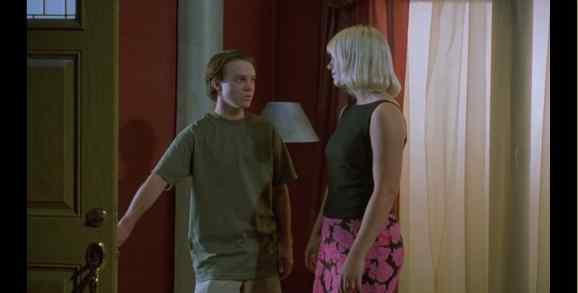
Denny (or Danny), a teenager from next door, enters unannounced just as Lisa tries on the red dress Johnny bought her (“I would do anything for my girl.”). Denny is like a son to Johnny, and the details of his past and present are consistently shrouded in mystery. One can assume that Denny’s character’s purpose is to showcase Johnny’s charity and goodness, as Johnny is paying for his schooling, but rather, the character, as he comes and goes, only accentuates the world’s lack of stability.
Within five minutes of the film comes the first love scene (the first between Johnny and Lisa, which Denny tries to be a part of). Formulaic R&B plays throughout the over-three minute scene, complete with an excess of candles and rose petals. The scene is less a sex scene than an abstraction of a sex scene, holding all the pieces but failing to put them together in any meaningful way. The morning after begins with Johnny’s pale naked rear, a variation of the creepy theme, and a candelabra of red candles hovering over Lisa’s body. While the text reads romance, the scene actually reads macabre and almost gothic. Disaster and fatality hang in the air regardless of whatever is happening in the plot. The lifeless sex scenes continue, with another ten minutes later, and yet another around the half hour mark.
The next highlight in the film comes seconds later as Lisa’s mother (Carolyn Minnott) enters the living room (assumedly the “room” the film is named after). In another strangely lit scene with ample amounts of red and black, Lisa admits to her mother that she no longer loves Johnny. Lisa’s mother tells her she has to marry Johnny, for the money, and then exits within sixty seconds.
One of the critiques against The Room is its failure to hold a scene for any substantial amount of time, and that its transitions are too awkward and upfront. The scene with Lisa’s mother is just the first of several scenes where a character jarringly enters and leaves for no apparent reason other than to advance the “plot.” Characters are in a hurry, but for nothing in particular.
In one scene, Denny stops in to see Johnny, who is not home. Lisa, who is “busy,” offers to let Denny stay and wait, but Denny then claims he is busy and must leave. Meanwhile, Denny also playfully obsesses over Lisa’s beauty, further making the scene feel disjointed and discordant. The writing in the script is not good, but somehow the film manages to still have a distinct impact other than the simple “so bad it’s good.” As Denny flirts with Lisa, his forced grin sends awkward chills up the viewer’s spine.
These quick, motionless scenes are absurd, in an almost Beckett way, yet The Room, unlike Godot, is striving for realism. As the characters rush around, failing to make connections, they become less and less real. Most human interaction in the film, especially with Johnny, is reduced to a series of catchphrases.
Later, Lisa makes a phone call to Mark (Greg Sestero), who claims he is very busy (twice) but seems to just be waiting in his car wearing sunglasses doing nothing. Lisa seeks to cheat on Johnny by seducing Mark, Johnny’s best friend, which is the major plot of the film, for no real reason other than the fact that she “no longer loves him.” Throughout, she attempts to turn people against Johnny, framing him for drunkenly attacking her (which never happens), despite his unsubtle adoration for her (“…and I love Lisa so much.”).
Mark’s character is just as mysterious and inexplicable as the rest of the cast. With every scene, his view of his relationship with Lisa shifts, from sometimes defending Johnny to sometimes trying to hurt him on purpose. Lisa and Mark’s relationship, and especially Lisa’s hatred of Johnny, is as absurd as it is genuinely upsetting and uncomfortable. If Wiseau sought to make her a truly and archetypically evil character, he succeeded, despite how flat and unreal she may be.
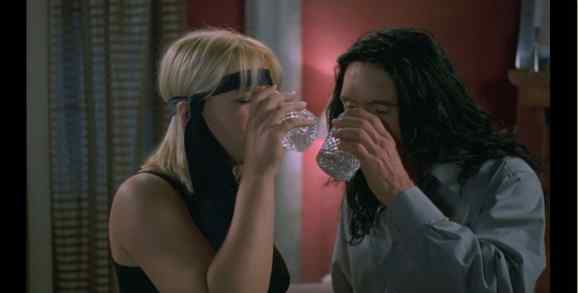
In yet another scene, Johnny comes home to reveal he did not receive a promotion. Lisa, fresh from cheating with Mark, is kind to Johnny, and even orders him a pizza. Johnny’s despair is difficult to read due to Wiseau’s acting (he laughs with inappropriate lines of dialogue), and Lisa’s inconsistency confuses the issue. The two drink, of course over the film’s eerie theme, and the scene has a sense of real decadence and sin that audience members must look away from. Full of dull reds and blacks, the drinking scene continues the film’s inadvertent gothic overtone, and Johnny’s dialogue continues the film’s upsetting lack of realism (“I’m tired. I’m wasted. I love you darling!”).
Lisa struggles to convince the boozed Johnny to make love to her, but does, and the sex footage seems to be exactly lifted from the first sex scene from earlier in the film. Lisa’s personality ambiguities emphasize her sociopathy. In the next scene, between Lisa and her mother, Lisa begins the conversation by inviting her mother to a party Lisa is throwing for Johnny, then, without warning, claims she hates Johnny and that he abuses her.
Among the central plot are a dizzying amount of subplots, zero of which have a conclusion or specific use in terms of character or world development. Lisa’s mother’s breast cancer and estate issues, Mike and Michelle’s nonsensical porn romance (that occurs in Johnny’s home unrealistically), along with Denny’s unexplained (and extremely dangerous) encounter with his “drug dealer,” are all left hanging as soon as they are introduced, failing to further the plot or verisimilitude. These short segments almost attain a slice of life quality, but are too absurd and fall short, becoming minutiae.
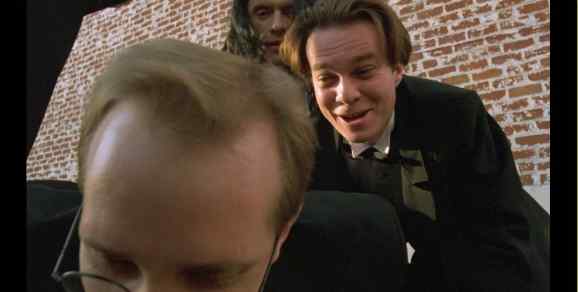
In one of the most infamous scenes in the film, Johnny, Denny, Mark, and their friend Peter play football in tuxedos. The scene goes to great lengths to avoid advancing the plot or character development and ends with Peter falling and hurting himself. In a previous scene, Mike also hurts himself during a game of catch. These scenes are senseless, but also dangerous, and while trying to be light, and maybe even humorous, only add to the layers of meaninglessness of the film’s text.
Each scene in The Room is comic, melodramatic, but also macabre and abstract, so that they cannot be read easily.
Audiences roll in the aisles with laughter at the emergent humor, at how awful they deem the film, but these elusive qualities, the gothic tones, the cold inhumanity and absurd danger, give The Room a distinct atmosphere of drama-less horror, horror in a void.
Wiseau’s The Room is a film about the absence of love, but, inadvertently, it is a film about the absence of life. With so many scenes and characters with their own subplots, the film somehow avoids any real human contact or emotion. The film would work as a post-modern, cynical text along the lines of American Psycho or Gerald’s Party, works of art that can be explained and understood, ones that have theme and aesthetics, but Wiseau’s prevailing sense of weirdness clouds out any real understanding or meaning.
While the film is obviously hilarious, its dark ending is somewhat moody considering how melodramatic it is. The violence comes to a climax, and for once in the film, characters act like humans with real emotions. With shock and desperation, the surviving characters struggle to comprehend their emotions and actions, but the time to be human has passed. It’s too late. Through tragedy, the characters are thrust into the real world, albeit a highly stylized one, momentarily, and find it unbearable.
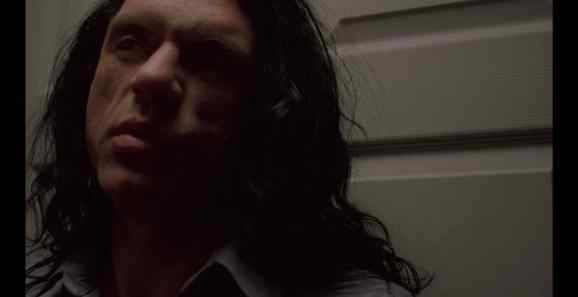
Even viewers who find the film as one hundred percent silly will find the ending troubling, and can only deflate the seriousness with a roll of their eyes at the melodrama. Wiseau’s climax is supposed to deliver a shock, and it does, but not quite for the reasons he seems to have wanted.
There is a slight irony in the fact that both the popular reading of The Room (awful and hilarious) and this defense of it (inhuman and unstable) completely disregard and circumnavigate Wiseau’s original vision of a classic American family drama. As per Barthes, one can read any text as he sees fit, without the context and intentions of the author. The “death of the author” is a wholly post-structualist and post-modern idea, and through this lens, new life can emerge from the text. Is this critique useful? Is it cruel?
The Room is clearly out of hand, seemingly written and directed by a man who has never had contact with another human being. It is only popular due to its perceived “badness,” yet, the film manages, somehow, to transcend merely being “so bad it’s good.” Wiseau’s The Room had little potential for greatness. There was nothing worthwhile in its lackluster script, nothing new or shocking or even remotely interesting. It is incredible that the sum of the film’s parts amount to anything, but they do, making the film valuable for more than just laughs. The Room is unlike any other film before it.
What do you think? Leave a comment.











Nilson, I am very impressed with this article and with the zeal with which you present your point of view. For a moment, I thought this was just going to be a joke and at the end you were going to say something like, “Or maybe it is garbage after all”, and while it would’ve been funny, it would’ve also been a bummer to see such good arguments be thrown away. It’s very admirable that you stuck to your interpretation the whole way through.
I was introduced to The Room by Doug Walker’s Nostalgia Critic episode, and I remember that at the end he says something akin to, “While it’s a God-awful movie, you really should see it. It’s so bad that it must be seen to be believed.” Obviously he’s being funny, and completely subscribing to the so bad it’s good point of view. But what I find so good about your piece is that you don’t immediately do that. You acknowledge the bad things about the film but you see them as having a connection to Wiseau himself.
In the end, I think your interpretation is summed up when you say that this movie is about characters who don’t know what it’s like to be human because it was made by a very peculiar man. In this sense, the horrid acting and screenplay don’t just seem bad in and of themselves but are bad in accordance with the story.
Personally, I’ve never understood the “so bad it’s good” mentality; I’ve always just figured if it’s bad it’s bad. And while I can’t say that your piece has moved me to watch The Room, it has at least shown me that a person can extract a measure of meaning from it and provide a very interesting interpretation.
Well done Nilson, I enjoyed this piece very much 🙂
It’s too genuine. Everything is played straight.
I just can’t believe nobody saw the script or saw Tommy act and didn’t realize what a disaster this could be.
When it first came out, the theory I had was that it was some sort of strange experiment gone awry, maybe due to differing visions of what the film was supposed to be. It seemed like Johnny was originally intended to be a very strange character and maybe later on they attempted to edit the film to make him seem more normal. Perhaps there was a lot of footage missing that would have explained what we were seeing. Films have been ruined like this when strong personalities have tried to pull the production in different directions.
A theory a friend had was that the producers had some kind of falling out with the auteur Tommy Wiseau so they intentionally included every worst take of him and ruined his masterpiece. That would have been pretty funny.
Years later when I read Disaster Artist, I found it had been an attempt at filming a very simple and straightforward story, every odd moment was from incompetence, and Tommy is just a strange man on and off the screen. I never thought of this.
It turns out Tommy isn’t alone. There is another auteur much like him: rich from real estate, wanted to be a big time movie star and had no idea what a good movie is. His name is Neil Breen and he wrote, directed and starred in a movie called Double Down. It features Breen as Hollywood’s newest action super star in a story made from plot points and devices from two dozen other sci-fi/action movies in random order. It didn’t get the press that The Room got because Breen is a pretty normal guy and Double Down fell into the crowded genre of cheap action movies made for cable television.
Words cannot describe how horrible this movie is.
I really like this article! I’ve never watched it because “bad” movies tend to give me second hand embarrassment but I like the concept of being “so bad its good.” Really cool thoughts!
Best movie since Gone With The Wind
I have heard so many bad things about this movie. It sounds hilarious, great article.
This movie had a lot going for it.
Much of the camera motion looks professional. Far too many bad movies either plant the camera on a tripod or go for the caffeinated hand-held zip-zoom look. The dolly set ups were done fairly well.
Most of the lighting is acceptable to good. Instead of going for the bright shadowless look, there is decent modelling and realistic shadows on the interior sets. There is even classic “core lighting” on Lisa’s face when she has been confronted. It’s a bit brighter than what I like but it’s a common look.
Most of the soundtrack is acceptable. The simple classical music is much less obnoxious than the R&B disasters during the sex scenes. Soundtracks often make independent films unbearable because someone involved in the production always has a friend who’s “in a band” and will make music just to get into the end credits.
The green screen for the rooftop scenes was fairly convincing.
Everyone seems to agree that this is one of the worst widely seen films ever made.
I need to see this movie, especially after reading this, and if for no other reason than to say that I have. Great article, Nilson.
Everyone should watch it for 3 principal reasons.
1. We’ve become so used to watching movies that are made with an acceptable level of competence and production value that many of us have taken these things for granted. The Room will made you appreciate how many things go into a movie to make it look professional. It’s kind of like watch bad television shows from the 1970’s.
2. You can pretend it was an experimental film made by someone who purposely discarded what we normally associate with professional film production. Hey, Goddard made some screwy films too. That was my original theory when I first saw it, before I had heard about how the star/director didn’t know what he was doing and had fired many competent people.
3. You can use it as a practical joke on someone who has never heard of it. Tell them it’s an amazing movie. Watch it with them and pretend to be mesmerized by the depth of Johnny’s character, how he has a special way of saying things, how muscular his bare ass is, and every awful subplot is an insight into modern life. Hint that there is going to be an incredible ending, like Johnny is actually a vampire or a serial killer or an alien. Then enjoy the confused look on their face when the film ends.
Can’t wait to pull the third one some day!
Love that 3rd one! 🙂
The best worst movie of all-time.
Other than providing good laughs, this film has no redeeming qualities. This is the worst of the worst.
Upon reading The Disaster Artist, you realize that Tommy had a LOT of professionals working with him, and he was too dumb to realize it. Seeing how he mistreated them makes it understandable why he replaced the whole crew three times over. The fact that they ever put any effort in (which they didn’t always) is impressive.
That said, in terms of directing, acting, writing, it’s a disaster through and through. And for me, that trumps any remote effort put in by the pros.
Second worst movie I’ve ever seen in the last 60 years of movie watching. The acting ranged from painfully awful to ‘I can’t believe my eyes and ears.’ Tommy Wiseau, his ‘future wife’ and her mother led the stampede of awful.
I almost turned off this movie a couple of times, but I kept watching to see if it could get any worse. It could, and did.
Too bad this Wiseau character can’t be imprisoned for crimes against the art of cinema.
It’s on par with “The Shawshank Redemption.”
It’s just one of those things you have to experience. It’s not as good after the first time, but come back to it about once a year and it’s amazing. I still laugh on parts I forget about and things I haven’t noticed.
Also, to be honest, you can actually learn a lot about film making while watching this. That is, what NOT to do when making a movie. It’s definitely one of those films that has to be seen to be believed.
Your writing is really elegant. I loved this article. I’ve heard a lot about The Room (mostly bad things), but I haven’t seen it. From your description, it seems like the film changes direction at the speed of thought (or faster). This film is now on my to-watch list.
Great work!
Love the article, mate. Never thought I would see the names of Barthes and Wiseau in the same piece, but such a reading is quite a profound one. But, I do not know if it is really worth people to keep talking about, even though I’ve never got through it. At least it is technically competent, I would argue that Things (1989, http://www.imdb.com/title/tt0183881/) is worse.
A really great read. The Room really disturbs me for some reason, there’s something about the performance style that gets under my skin. If I can bring myself to watch it again someday I might be able to embrace it.
YOU’RE TEARING ME APART NILSON
Normally, when discussing The Room, I can’t do so without laughing or getting a headache, so I appreciate your thorough analysis of the film’s atmosphere. I would also recommend that anyone who’s intrigued about the making of the film should read The Disaster Artist. If I recall correctly, many of the performers were as baffled by the script as the audience.
This was a very interesting perspective, great read
Great article. All the other analyses I have encountered on this film were comedic. This article is thorough and thought provoking.
The film sound like a train wreck: it looks horrific and yet you can’t look away.